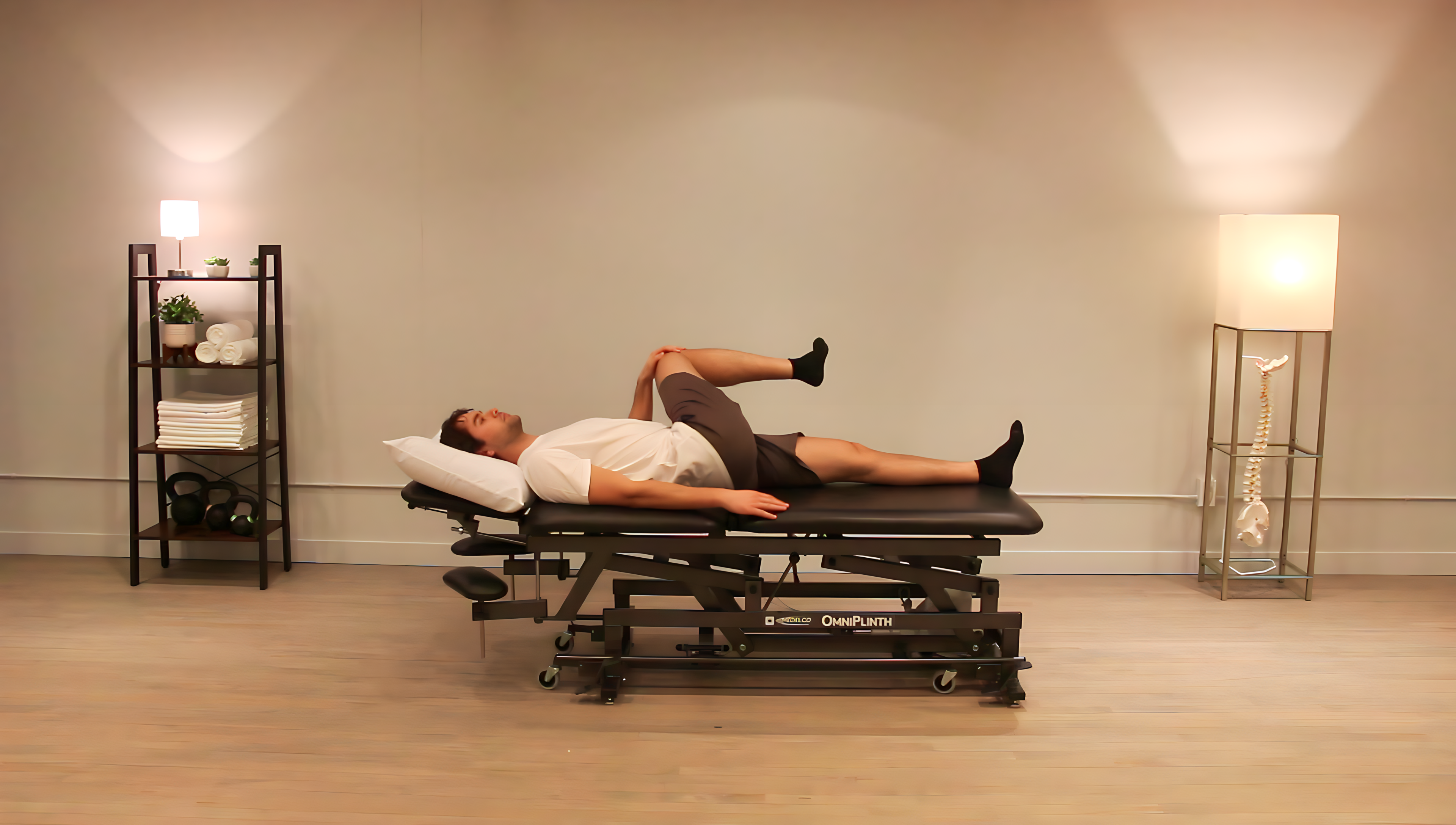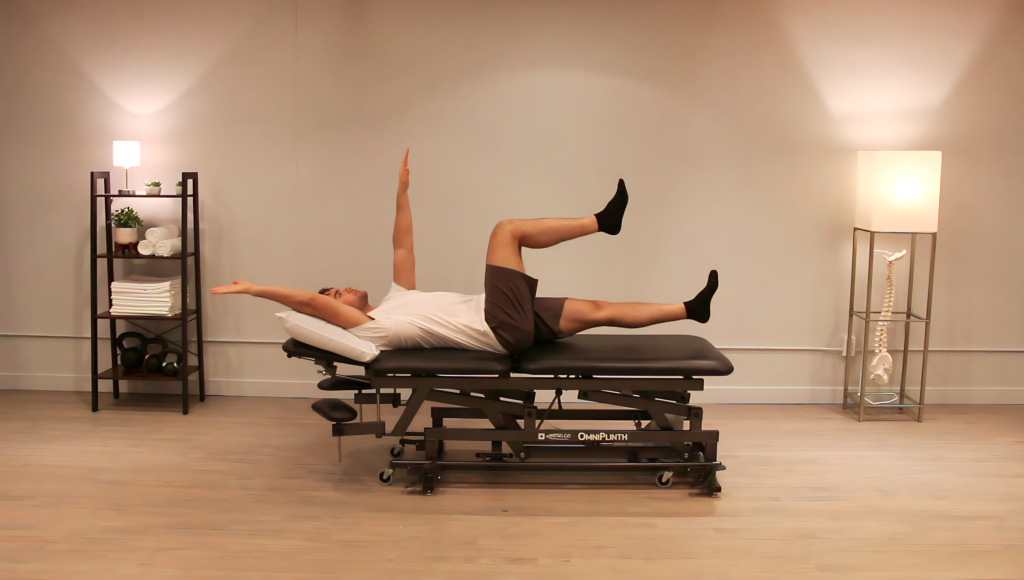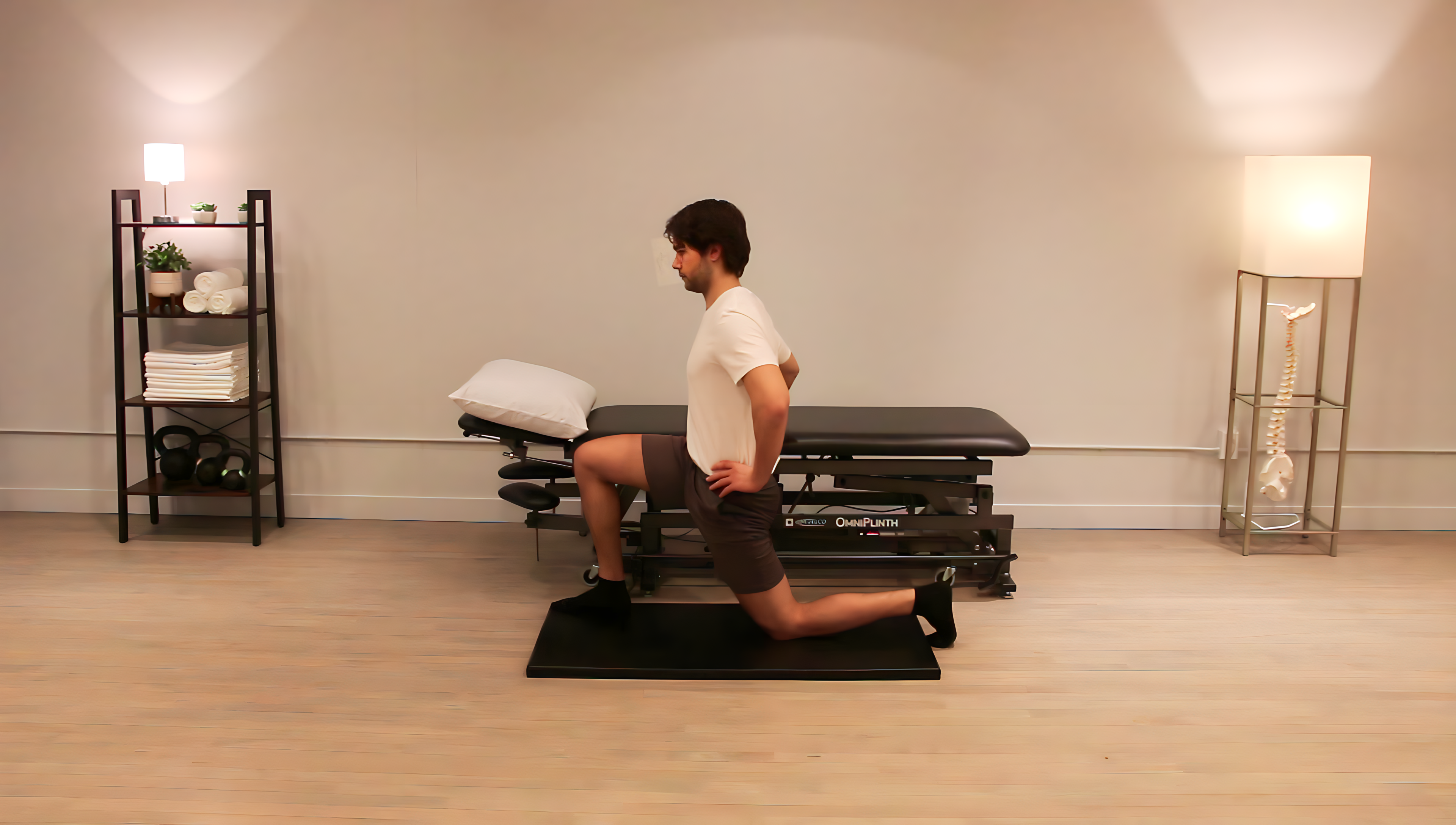
ThePainFreeBack

Your Program
Below you will find 5 sections:
Section 1 will help explain the mechanisms and systems responsible for your pain. It will also help you understand the reasoning behind the exercises and other recommendations we will make.
Section 2 will help you determine your correct exercise “dosage”. Just like with medication, it’s not only about having the right pill but taking the right amount. This section will also help you adapt your program as your back pain changes and gets better.
Section 3 is your actual exercise program. With each exercise, you will find a text description of how to properly perform the motions involved as well as picture and video demonstrations.
Section 4 will include practical recommendations on how to avoid aggravating your back and how to better manage the pain in your day-to-day life.
Section 5 will explain the connection between your brain and back pain, as well as how you can disrupt the “Pain Cycle”.
These 5 sections are your roadmap to conquering your back pain. We have no doubt that you’ve got what it takes to make a positive change in your life, but your success still depends on your effort and commitment. With consistency and only about 10 minutes a day you can be the hero in your own journey.
You’ve got this!
Section 1: Why does my back hurt?
In this section, we will help you understand why your back might be hurting.
Before we begin, it is important to remember that there are many factors that contribute to back pain and that mechanical changes such as the ones described below do not define your back. Even an MRI or an X-ray would not be able to entirely capture what you are experiencing. Accordingly, they are NOT necessary in the vast majority of back pain cases.
With that said, understanding the anatomy and mechanisms of your back can be helpful in reducing pain-related fear and promoting healthier habits.
So here is what you need to know:
Based on your answers to the quiz, it sounds as though you are experiencing an increase in pressure at your SI joint. However, it is important to understand that this does not mean your spine is “permanently damaged”. Rather your back has entered a temporarily agitated state and just needs the right conditions to return to being pain-free.
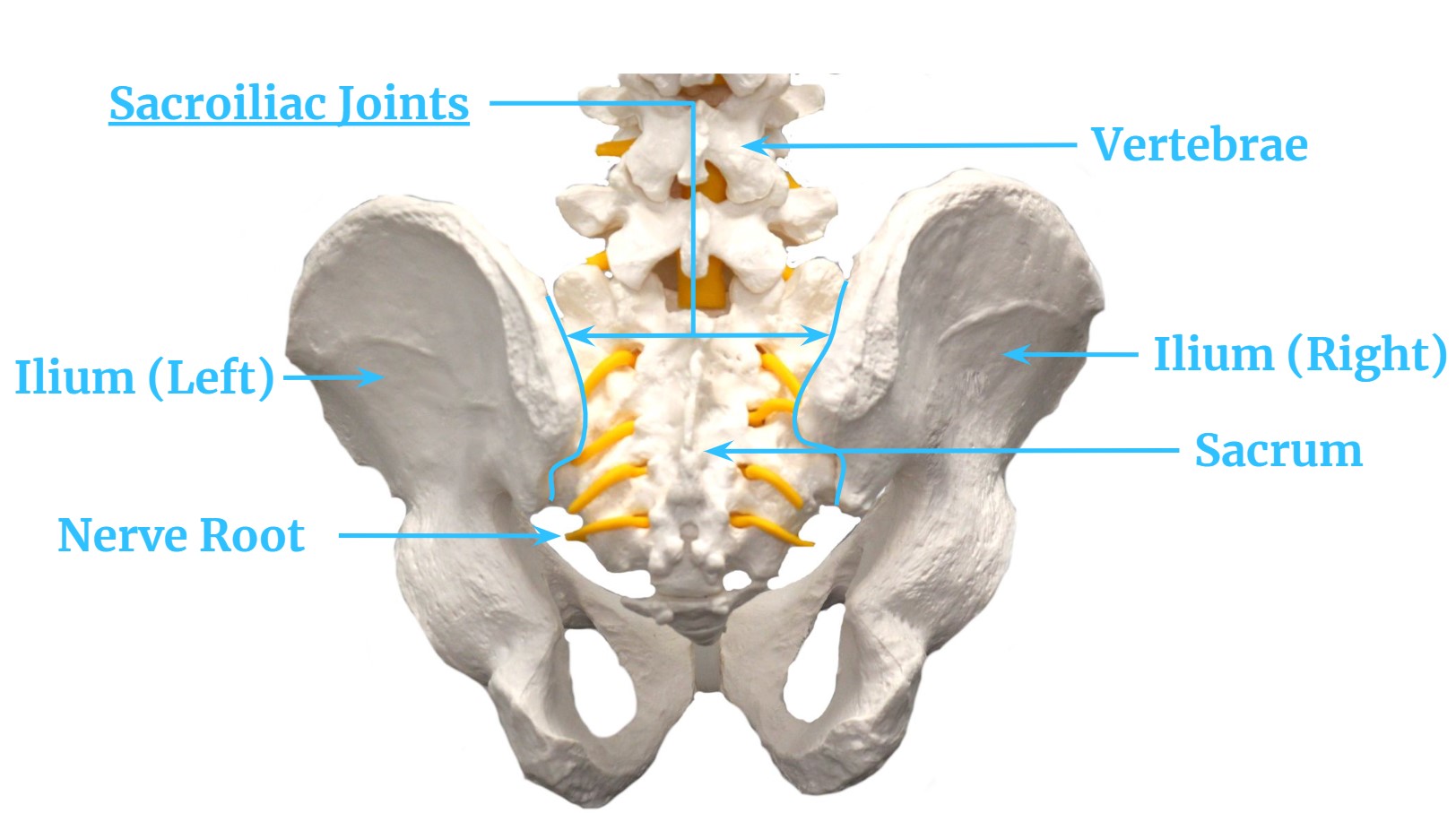
Accordingly, you can overcome your back pain by reducing the amount of pressure you put through your SI joint. Your exercises and other recommendations are based on this principle.
However, many daily tasks will naturally increase the pressure at your SI joint. Does this mean these tasks and activities have to be avoided completely? While you should try and avoid increasing SI joint pressure until your pain subsides, loading the SI joint is thankfully not something to be afraid of.
By strengthening specific muscle groups such as your core and stretching others like your glutes, your SI joint will once again be able to tolerate the forces it was designed to handle.
The information above is intended to help you understand that what you are experiencing is capable of change and that you are not destined for a life of pain. You have a perfectly normal back that just needs a little bit of extra attention.
Section 2: Exercise Dosage
In this section, we will discuss the amount of exercise and activity that is right for you.
The recommended amount of exercise will be described using 3 main terms: Volume, Frequency, and Intensity.
- Volume
- Frequency
- Intensity
![]()
Volume refers to how much of each individual exercise you should perform in a single session. Volume is measured in “repetitions” or “time”. If an exercise is measured in repetitions you repeat the movement that many times. If an exercise is measured in time, you hold the position for that amount of time.
Repetitions and time are given in “sets”. A set can be thought of as a group of repetitions. A set of repetitions should always be separated by a short break. We recommend starting with breaks that are 30-60 seconds long.
So for example, if you are doing 2 sets of 10 repetitions, you perform the exercise 10 times, rest for 1 minute, and then do another 10 repetitions for a total of 20 repetitions
![]()
Frequency refers to how many times you should complete an exercise at the recommended volume in a given amount of time. For example, you may be asked to perform the exercise at a frequency of 2 times per day, once in the morning and once before bed. If the recommended volume for this exercise was 2 sets of 10, you would do 2 sets of 10 in the morning and another 2 sets of 10 before bed.
![]()
Intensity describes what you should feel during an exercise. During some exercises you should feel your muscles get tired, in others you should feel more of a stretch. The intensity will help you know when you are doing the exercise right and how much you should be pushing yourself.
In order to get the most out of exercise you should challenge yourself, but more isn’t always better.
- Rating discomfort
- When to do less
- When to do more
![]()
Before you are active or attempt an exercise you should ask yourself: “On a scale of 1-10, how much discomfort do I feel?”
A score of 10 means you are experiencing the most discomfort you can imagine and a score of 1 means you are experiencing very little discomfort. There is no right or wrong answer to this question, what 10/10 discomfort feels like is totally up to you.
The answer to this question will help you determine if you should be doing less, or doing more of the activity/ exercise in question.

Exercise and activity should not increase pain and or discomfort by more than 2 points. This increase should also not last longer than 1 minute after completing an exercise.
If your pain increases by more than 1-2 points and/ or lasts longer than 1 minute following the exercise or activity, you have pushed too far.
If you experience an increase in pain of more than 2 points or if the increase lasts longer than a minute you should rest or attempt an exercise you know makes your back pain feel better.
Once your pain has returned to the original level you may perform this exercise again but you should modify the painful exercise by reducing the number of repetitions to avoid a similar increase in pain.
If you cannot perform more than 3 repetitions without increasing your pain, reduce the exercise intensity. Most often this will mean not moving as far in each repetition.
If you cannot find a level that feels appropriate to you after modifying the volume, and intensity stop the exercise entirely and focus on the ones you can do. Avoid the exercise for 1 week, then attempt to reintroduce the painful exercise gradually still following the rules above.
![]()
If you get relief from your pain with one of the exercises, feel free to perform that exercise as many times a day with as much or as little rest in between as you see fit. It is very hard to “overdo it” with such an exercise, but if at some point an exercise that once felt good becomes painful, return to doing an amount that felt good.
If you are able to perform an exercise with ease at the recommended amount, you should attempt to advance to the second level of that exercise. But be sure to wait at least 24 hours before making any changes. Your pain may not increase until some time after an exercise is complete.
If you get to the third level of the exercise and still find it to be easy, you should increase the volume of this exercise by doing more repetitions or sets. If you are performing more than 20 repetitions or holding a position for longer than 2 minutes and you still do not feel like you are being challenged, you should now increase the frequency.
If you increase the volume and frequency at the hardest level of an exercise and still don’t find the exercise challenging, you should continue to perform that exercise at the highest level you have the time and energy for as it will still be beneficial. However, focus on the exercises and activities that you find most helpful.
Click the “Show More” button below for a few other things you should consider…
Other things to consider…
Each recommended exercise has 3 alternative versions of varying difficulty so you can increase the difficulty of your program as your back gets better. Level 1 will typically be the easiest version of the exercise. However, you may actually find it to be more challenging than the other levels. If this is the case, stick with the level you find most challenging at the time.
Do not feel the need to progress the exercises all at once, it is okay to be doing level 1 of a certain exercise and level 3 of another. You also do not have to do all of your exercises in a row. You can do exercise 1 in the morning, and exercise 3 at your lunch break. Fit them in whenever is convenient for you.
You may also need to perform a specific level due to a limitation other than your back. For example, if you cannot perform and exercise with proper form and without pain due to a shoulder injury, choose the version you can do properly without aggravating your shoulder.
Lastly, some exercises will involve only one side of your body. On occasion, you will need to repeat the exercise on both sides, other times you will only perform the exercise on one side. The side you should perform the exercise on will be explained in the exercise description.
At the end of the day, this is your exercise program. Our recommendations are a great place to start, but you should always do what feels best for your back.
Section 3: Exercise Program
In this section, you will find the exercises that have been specifically selected to treat your back pain.
We have recommended 4 different exercises for you. Each exercise comes with a text description of the proper technique, as well as a picture and video demonstration. To view the video demonstration, simply click the picture of the exercise and a new tab will open. You can switch between difficulty levels by clicking the buttons above the included picture. The recommended Frequency, Volume, and Intensity will be provided below each exercise.
Do not attempt the exercises before understanding section 2.

Click the “Show More” button below to reveal your exercise program:
Exercise 1:
- Level 1
- Level 2
- Level 3
Piriformis Stretch
Exercise Description: To perform the “Piriformis Stretch” exercise begin by lying face up on a comfortable surface, this might be your bed or a yoga mat on the floor. Bring one knee upwards until your hip is bent about 90 degrees. Then reach your opposite hand towards your knee, grab the knee, and pull it across your body. You should feel a stretch in the buttock area. Hold this position for the recommended time or the amount of time you have determined to be optimal. Then repeat on the other side.
- Frequency: 2-3 Times per day
- Volume: 3 sets of 30 seconds
- Intensity: You should feel a comfortable stretch in the butt muscles of the leg you are lifting. If the stretch becomes too intense or painful lower your leg slightly until the stretch is tolerable.
Figure 4 Stretch
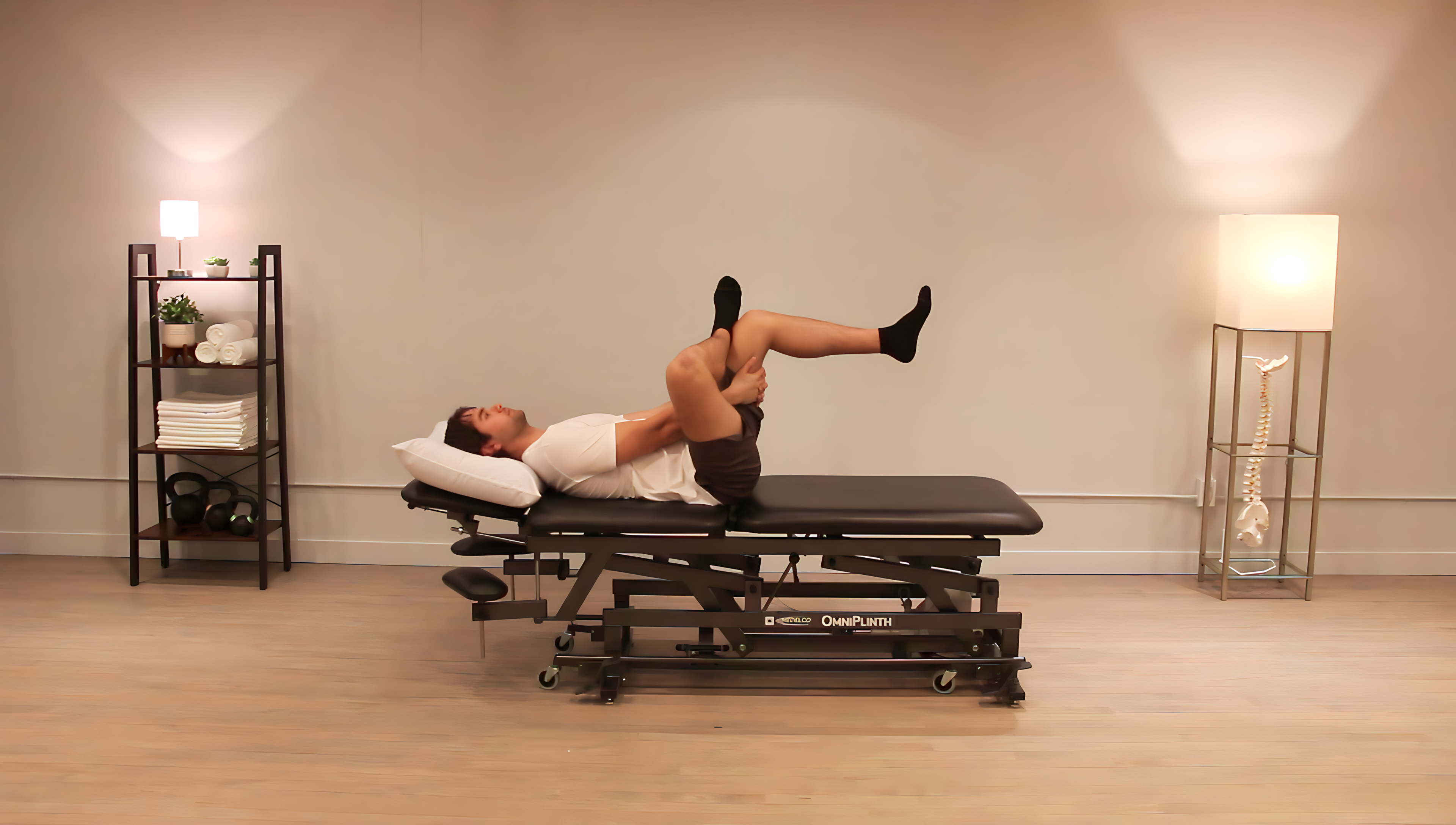 Exercise Description: To perform the “Figure 4” exercise, begin by lying face up on a comfortable surface, this might be your bed or a yoga mat on the floor. Bend your knees until your feet are flat, shoulder-width apart. Cross one leg over the other so that your ankle is on the thigh of the other leg. Warp your hands around the leg still in contact with the floor and pull your thigh upwards until you feel a stretch in the buttock area of the other leg. Hold this position for the recommended time or the amount of time you have determined to be optimal. Then repeat on the other side.
Exercise Description: To perform the “Figure 4” exercise, begin by lying face up on a comfortable surface, this might be your bed or a yoga mat on the floor. Bend your knees until your feet are flat, shoulder-width apart. Cross one leg over the other so that your ankle is on the thigh of the other leg. Warp your hands around the leg still in contact with the floor and pull your thigh upwards until you feel a stretch in the buttock area of the other leg. Hold this position for the recommended time or the amount of time you have determined to be optimal. Then repeat on the other side.
- Frequency: 2-3 Times per day
- Volume: 3 sets of 30 seconds
- Intensity: You should feel a comfortable stretch in the butt muscles of the leg you are not holding. If the stretch becomes too intense or painful lower your leg slightly until the stretch is tolerable.
Pigeon Stretch
 Exercise Description: To perform the “Pigeon” exercise, begin in a kneeling position on a comfortable surface, this might be your bed or a yoga mat on the floor. Bring one leg forward and rotate from your hip so that the outside of your leg is on the surface. Lean forward until you feel a stretch in the buttock area of the rotated leg. You may need to shuffle the other leg backward to feel the stretch. Hold this position for the recommended time or the amount of time you have determined to be optimal. Then repeat on the other side. You should feel a stretch in the buttock area of the front leg.
Exercise Description: To perform the “Pigeon” exercise, begin in a kneeling position on a comfortable surface, this might be your bed or a yoga mat on the floor. Bring one leg forward and rotate from your hip so that the outside of your leg is on the surface. Lean forward until you feel a stretch in the buttock area of the rotated leg. You may need to shuffle the other leg backward to feel the stretch. Hold this position for the recommended time or the amount of time you have determined to be optimal. Then repeat on the other side. You should feel a stretch in the buttock area of the front leg.
- Frequency: 2-3 Times per day
- Volume: 3 sets of 30 seconds
- Intensity: You should feel a comfortable stretch in the butt muscles of the leg you have brought forward. If the stretch becomes too intense or painful, do not lean as far forward.
Exercise 2:
- Level 1
- Level 2
- Level 3
Transverse Abdominis Activation
 Exercise Description: To perform the “Transverse Abdominis Activation” exercise begin by lying face up on a comfortable surface, this might be your bed or a yoga mat on the floor, whatever works best for you. Squeeze your stomach muscles in a way that causes your lower back to flatten against the surface you are laying on. It may be helpful to think about pulling your belly button towards your spine or to think about bracing your stomach for impact. Practice holding this contraction while still taking normal, controlled, breaths. Once you feel you can do this well, raise your arms overhead. Raising your arms will make holding this contraction a little harder. Do not allow your core to relax as you raise your arms. Hold your arms overhead for the recommended time or the amount of time you have determined to be optimal.
Exercise Description: To perform the “Transverse Abdominis Activation” exercise begin by lying face up on a comfortable surface, this might be your bed or a yoga mat on the floor, whatever works best for you. Squeeze your stomach muscles in a way that causes your lower back to flatten against the surface you are laying on. It may be helpful to think about pulling your belly button towards your spine or to think about bracing your stomach for impact. Practice holding this contraction while still taking normal, controlled, breaths. Once you feel you can do this well, raise your arms overhead. Raising your arms will make holding this contraction a little harder. Do not allow your core to relax as you raise your arms. Hold your arms overhead for the recommended time or the amount of time you have determined to be optimal.
- Frequency: 1 Time per day
- Volume: 3 sets of 30 seconds
- Intensity: This exercise should cause your core muscles to “tighten”. It should take a fair amount of effort to maintain this tightness as you raise your arm but it should not be painful.
Dead Bug
Exercise Description: To perform the “Dead Bug” exercise begin by lying face up on a comfortable surface, this might be your bed or a yoga mat on the floor, whatever works best for you. Squeeze your stomach muscles in a way that causes your lower back to flatten against the surface you are laying on. It may be helpful to think about pulling your belly button towards your spine or to think about bracing your stomach for impact. Raise your arms and legs so that your arms are straight out in front of you and your knees and hips are both bent to 90 degrees. While holding the contraction of your stomach muscles, straighten one leg and raise the opposite arm over your head, hold this position for 3 seconds, then return to the starting position. Make sure to take normal controlled breaths throughout the exercise. Repeat this motion the recommended amount of times or for the number of repetitions you have determined to be optimal.
- Frequency: 1 Time per day
- Volume: 3 sets of 30 seconds
- Intensity: This exercise should cause your core muscles to “tighten”. It should take a fair amount of effort to maintain this tightness as you move your arms and legs but it should not be painful.
Plank
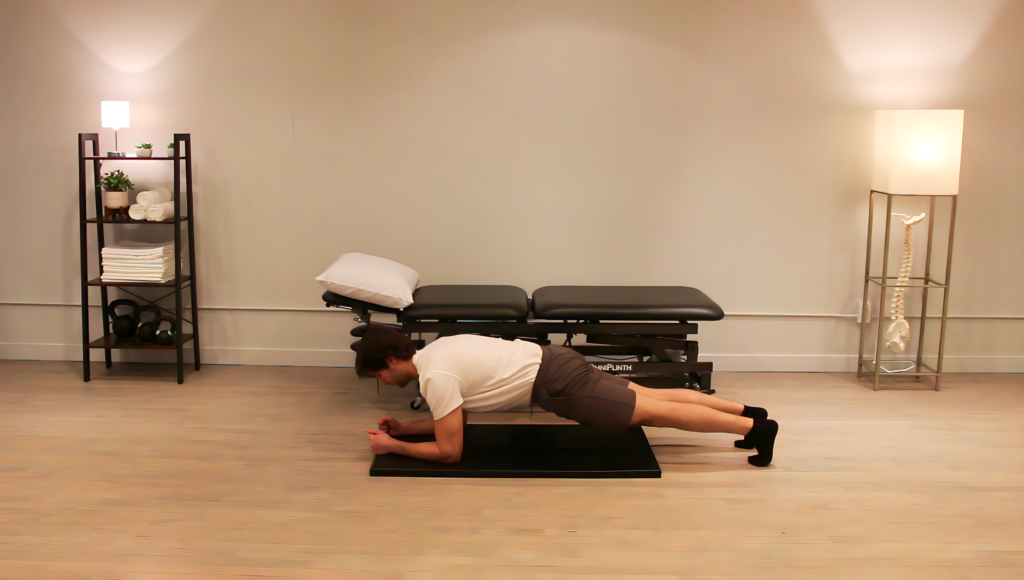 Exercise Description: To perform the “Plank” exercise, begin on a soft but firm surface like a yoga mat or carpeted floor. Prop yourself up onto your forearms with your elbows bent to 90 degrees. Lift your hips off the ground until your spine is in a neutral position. Be mindful to not let your back round in either direction. Hold this position for the recommended time or the amount of time you have determined to be optimal.
Exercise Description: To perform the “Plank” exercise, begin on a soft but firm surface like a yoga mat or carpeted floor. Prop yourself up onto your forearms with your elbows bent to 90 degrees. Lift your hips off the ground until your spine is in a neutral position. Be mindful to not let your back round in either direction. Hold this position for the recommended time or the amount of time you have determined to be optimal.
- Frequency: 1 Time per day
- Volume: 3 sets of 15-30 seconds
- Intensity: This exercise should cause your core muscles to “tighten”. It should take a substantial amount of effort to maintain this tightness without letting your back round but it should not be painful.
Exercise 3:
- Level 1
- Level 2
- Level 3
Raised Hip Stretch
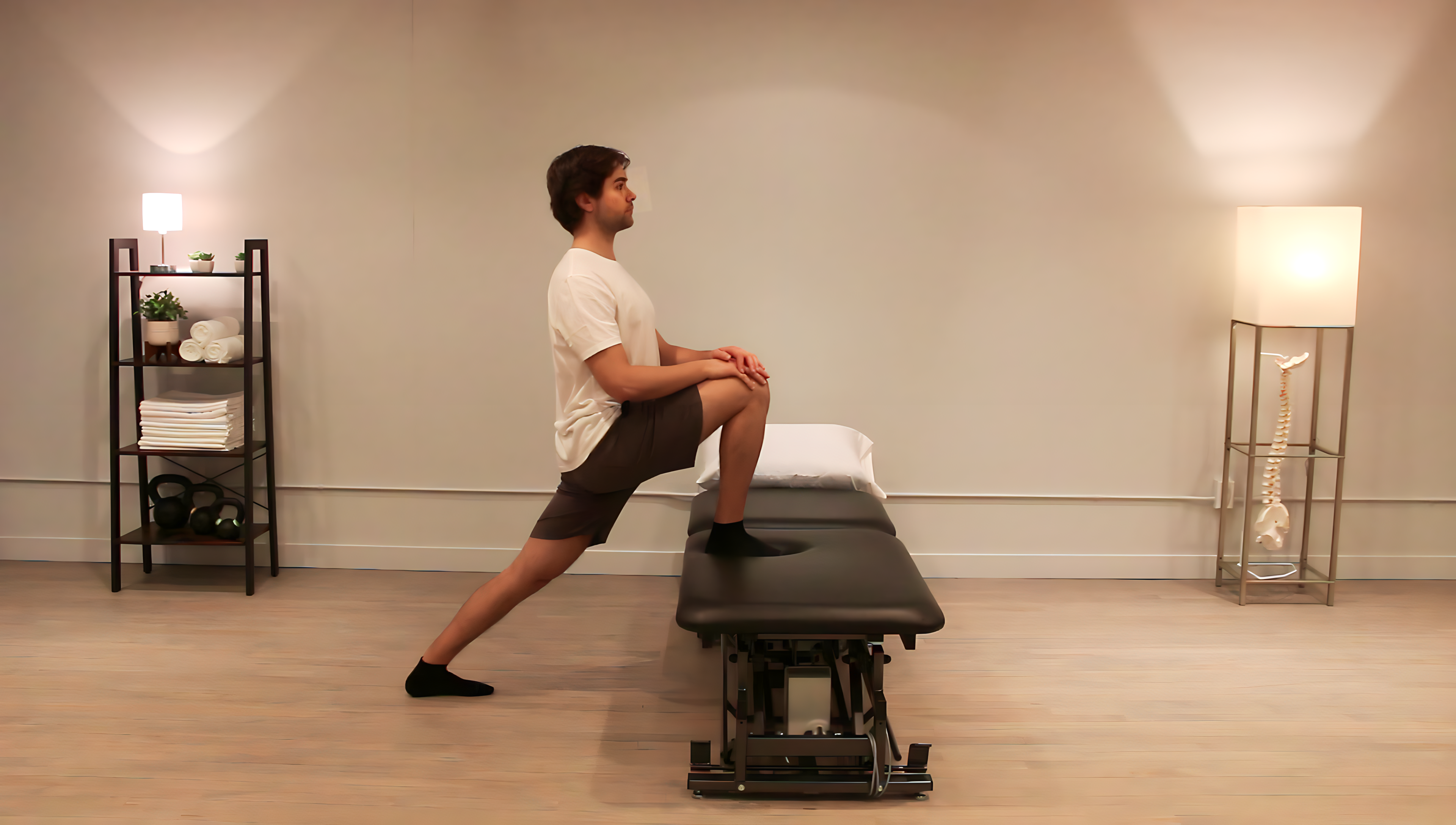 Exercise Description: To perform the “Raised Hip Stretch” exercise, begin by placing one leg on a raised surface, this might be on a staircase or a chair. Place one leg on the raised object and begin to lean towards that leg while allowing the other leg to extend behind you. You should feel a strong but comfortable stretch in the lower leg. Hold this position for the recommended amount of time of the amount of time you have determined to be optimal.
Exercise Description: To perform the “Raised Hip Stretch” exercise, begin by placing one leg on a raised surface, this might be on a staircase or a chair. Place one leg on the raised object and begin to lean towards that leg while allowing the other leg to extend behind you. You should feel a strong but comfortable stretch in the lower leg. Hold this position for the recommended amount of time of the amount of time you have determined to be optimal.
The higher the object you use the harder the exercise becomes, so find something the right height for you.
- Frequency: 1-2 Times per day
- Volume: 3 sets of 30 seconds
- Intensity: You should feel a moderate stretch in the front of the raised leg. If it is painful or strenuous, do not lean as far forward.
Hip Flexor Stretch
Exercise Description: To perform the “Hip Flexor Stretch” exercise, begin in a kneeling lunge position on a firm surface. You may want to be next to a stable object to help with balance and have a pillow under your knee for comfort. Slowly lean forward while not allowing your back to arch. You can prevent your lower back from arching by squeezing your buttock muscles, or by “tilting your hips upwards”. You should feel a stretch in the front of the leg with the knee on the ground. You should not have to lunge very far to feel this stretch. If you find yourself leaning quite far you are likely arching from your lower back. Hold this position for the recommended amount of time of the amount of time you have determined to be optimal.
- Frequency: 1-2 Times per day
- Volume: 3 sets of 30 seconds
- Intensity: You should feel a moderate stretch in the front of the leg with the knee on the ground. If it is painful or strenuous, do not lean as far forward.
Lunge
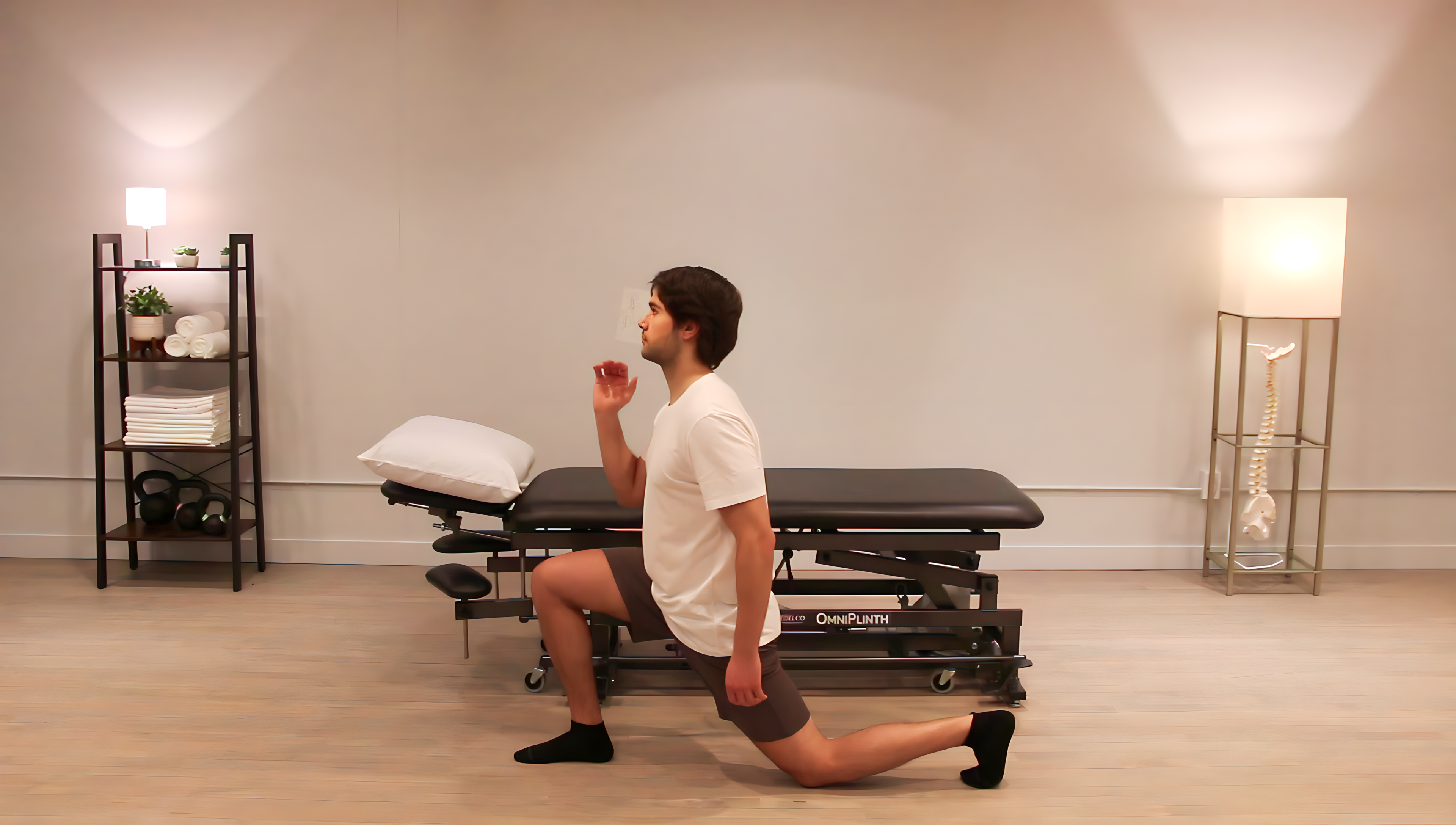 Exercise Description: To perform the “Lunge” exercise. Begin in a kneeling lunge position with both knees bent to 90 degrees. Slowly lift your knees off the ground while keeping your back upright. You may want to hold on to a stable object to help with balance. Hold this position for 3 seconds and then return to the starting position. Repeat this motion for the recommended amount of repetitions or as many times as you have determined to be optimal. Then switch legs and perform the exercise again.
Exercise Description: To perform the “Lunge” exercise. Begin in a kneeling lunge position with both knees bent to 90 degrees. Slowly lift your knees off the ground while keeping your back upright. You may want to hold on to a stable object to help with balance. Hold this position for 3 seconds and then return to the starting position. Repeat this motion for the recommended amount of repetitions or as many times as you have determined to be optimal. Then switch legs and perform the exercise again.
- Frequency: 1-2 Times per day
- Volume: 3 sets of 30 seconds
- Intensity: You should feel a considerable muscular effort in both your legs as you lift your body weight. If it feels painful or overly strenuous, do not go as low.
Exercise 4:
- Level 1
- Level 2
- Level 3
Straight Leg Raise
Exercise Description: To perform the “Straight Leg Raise” exercise begin by lying face up on a comfortable surface, this might be your bed or a yoga mat on the floor, whatever works best for you. Keeping your knee as straight as possible, lift the affected leg off the ground. As you do, pull your toes towards you. You should bring the leg high enough that you feel a stretch in the back of your leg, but not so high up that it becomes painful. Perform this motion for the recommended amount of repetitions or as many times as you have determined to be optimal.
- Frequency: 1-2 Times per day
- Volume: 6 sets of 10 seconds
- Intensity: This exercise should create some tension in the back of your leg and possibly a pulling sensation in your low back/ buttock area. This pulling sensation should be moderately intense but it should not cross the line into pain. It should also not be strenuous. If it becomes too intense, do not raise your leg as high.
Seated Hamstring Stretch
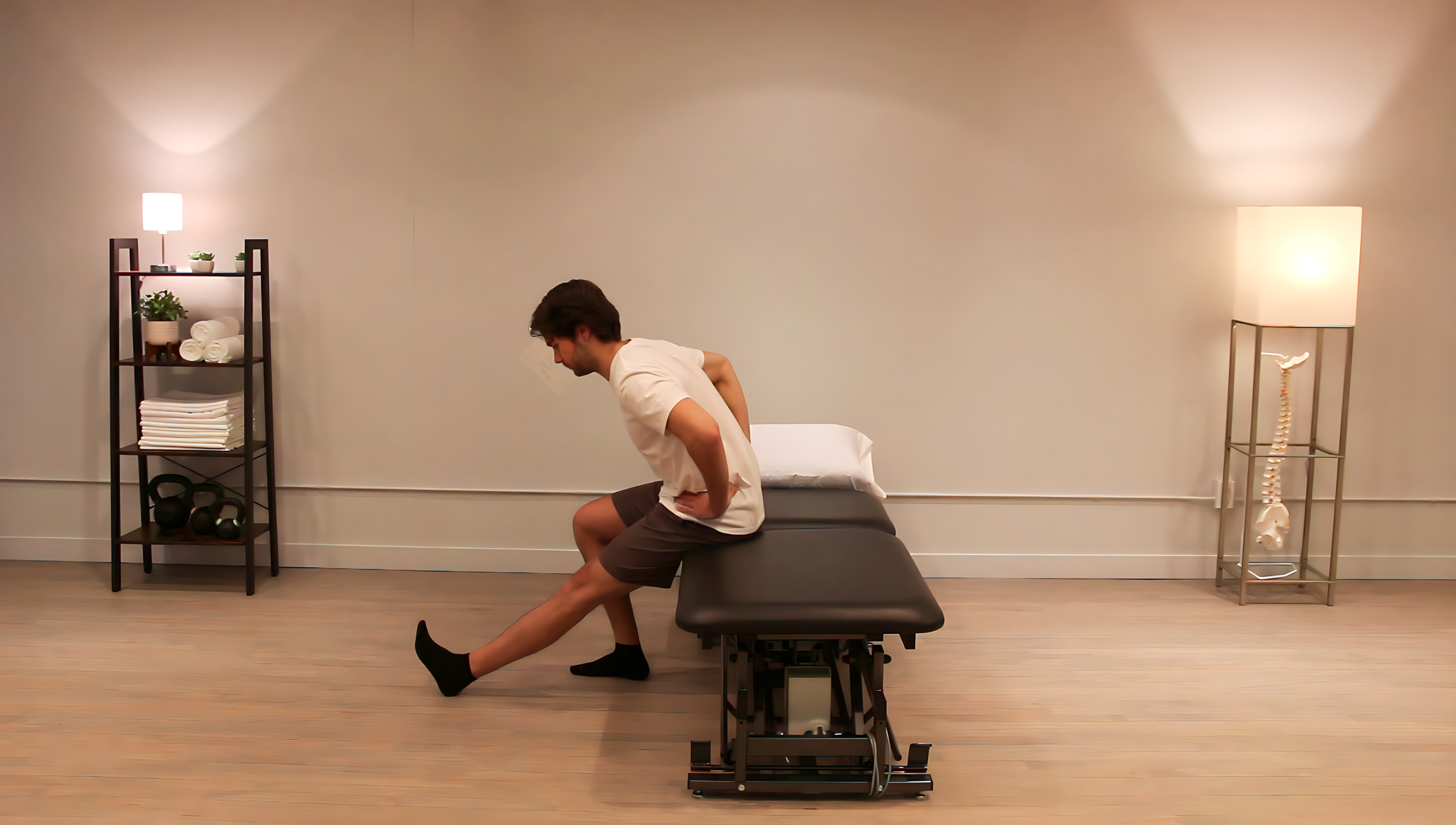 Exercise Description: To perform the “Seated Hamstring Stretch” exercise, sit at the edge of a chair and place one leg out in front of you with your knee straight. Pull your toes up towards you and then hinge at your hips and lean forward towards your toes. Lean as far as you can without triggering pain. You should feel a stretch in the straight leg. Hold this position for the recommended time or the amount of time you have determined to be optimal. Then repeat on the other side.
Exercise Description: To perform the “Seated Hamstring Stretch” exercise, sit at the edge of a chair and place one leg out in front of you with your knee straight. Pull your toes up towards you and then hinge at your hips and lean forward towards your toes. Lean as far as you can without triggering pain. You should feel a stretch in the straight leg. Hold this position for the recommended time or the amount of time you have determined to be optimal. Then repeat on the other side.
- Frequency: 1-2 Times per day
- Volume: 3 Sets of 30 seconds
- Intensity: This exercise should create some tension in the back of your leg and possibly a pulling sensation in your low back/ buttock area. This pulling sensation should be moderately intense but it should not cross the line into pain. It should also not be strenuous. If it becomes too intense, do not lean as far forward.
Runner’s Stretch
 Exercise Description: To perform the “Runner’s Stretch” exercise, begin by sitting on a firm but comfortable surface. Place one leg straight out in front of you and bend the other so that your foot is tucked in near the thigh of the other leg. Reach forward towards your foot keeping your leg flat on the floor. Lean as far as you can without triggering pain. You should feel a stretch in the straight leg. Hold this position for the recommended time or the amount of time you have determined to be optimal. Then repeat on the other side.
Exercise Description: To perform the “Runner’s Stretch” exercise, begin by sitting on a firm but comfortable surface. Place one leg straight out in front of you and bend the other so that your foot is tucked in near the thigh of the other leg. Reach forward towards your foot keeping your leg flat on the floor. Lean as far as you can without triggering pain. You should feel a stretch in the straight leg. Hold this position for the recommended time or the amount of time you have determined to be optimal. Then repeat on the other side.
- Frequency: 1-2 Times per day
- Volume: 3 Sets of 30 seconds
- Intensity: This exercise should create some tension in the back of your leg and possibly a pulling sensation in your low back/ buttock area. This pulling sensation should be moderately intense but it should not cross the line into pain. It should also not be strenuous. If it becomes too intense, do not lean as far forward.
Section 4: Pain Management
In this section, we will share how you can avoid pain triggers and ways you can help control your back pain on a day-to-day basis.
In general, activities that increase pressure at the SIJ are the most likely to be aggravating. So, things like jumping, standing on one leg, or sitting for long periods of time should be avoided. These are just a few examples of things that may trigger your pain, it is not a complete list.
With this said, use your judgment to modify your daily routine to remain as active as possible while avoiding triggers. Continuing with your daily routine the best you can will help your back recover faster than complete rest.
As you progress and the exercises become easier, you should reintroduce the activities and positions that previously bothered you. But, do so gradually. This will increase your back’s ability to handle these positions without overwhelming it.
Click the “Show More” button below to show the specific recommendations we believe will help you the most:
Activities of Daily Living
- Sitting
- Walking
- Sleeping
- Lifting

When sitting, you should choose a seat that is soft and cushioned but still has a supportive backrest. A high-quality office chair would be a good example of such a chair. Regardless of the chair you use, switch positions frequently. It may even be helpful to interrupt long periods of sitting with 30 seconds or so of standing. Avoid sitting with your legs fully extended such as you might when putting your feet up on a coffee table. This position increases tension on nerves and puts additional pressure on your back.
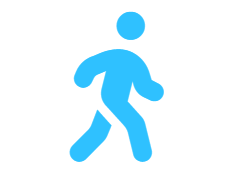
Standing and walking may at times be difficult and you may need to rest more often than you normally would. This does not mean you should avoid walking and standing entirely, the more you are able to do pain-free the better. When walking, try taking shorter steps to limit the amount of extension your spine experiences. When standing, engage your core and tilt your pelvis upward. This will help take your back out of extension and make standing a little easier.
![]()
The best position would be on your back with pillows under your knees to keep your back in a neutral position and remove tension on the nerves. Sleeping on your side is okay too, but place a pillow between your legs and under your hip to help support your spine. In the case that you find sleeping on your stomach the most comfortable, you can continue to do so. But if you do choose to sleep on your stomach be mindful of your neck position as sleeping on your stomach may cause your neck to be sore when you wake up. You may also want to try some of your exercises right before bed to help you sleep pain-free.
![]()
In the early stages of recovery, avoid lifting heavy objects. But, if you must, follow these steps:
1. Stand close to the object, position your feet shoulder-width apart.
2. Squat down and keep your back straight and your chest up.
3. Tighten your core muscles, and use your legs to lift the object, keeping it close to your body.
Don’t twist your back as you lift. Instead, pivot your feet and turn your entire body. If possible avoid lifting overhead until your back pain has subsided as reaching overhead brings your back into extension.
If bending forward is painful, it should be avoided. You may want to use an assistive reacher until your pain subsides. For something like tying your shoes, bring your foot onto an elevated surface so you do not have to reach as far down. Using a shoe horn may also be helpful.
General Recommendations
- Exercise
- Ice and Heat
- Medication
- Other

Some of the exercises we provided may have an immediate pain-relieving effect. These exercises can be done multiple times a day as a way to control pain when you need it. Motion can have a therapeutic effect through many avenues including increasing blood flow, releasing endorphins, and promoting relaxation. To avoid “overdoing it” listen to your body, if something feels good do more of it, if it hurts do less.
![]()
Ice and heat can also help control pain. Both can be useful, but if you’re unsure, try using heat for stiff muscles and ice for sharp, acute pain. You can use both in combination, starting with ice and finishing with heat. Use each for 15-20 minutes at a time, and monitor your skin temperature to avoid burns or frostbite. Typically you should place ice or heat directly over a sore area, but you may also find benefit from treating the surrounding areas.
![]()
There are many different types of medications used in the treatment of back pain. Some of these can be obtained over-the-counter and others will require a prescription. If this is something that interests you, a conversation with your doctor or pharmacist is a good way to determine the pharmaceutical treatment options for you. Keep in mind that medication is not necessary and is rarely enough on its own to stop back pain. Instead, when appropriate, it should be used in addition to a more comprehensive program such as this one.
![]()
Finding things that provide you with temporary relief is a very normal way to get through the day. Some ways to find temporary relief include TENS (Transcutaneous Electrical Nerve Stimulation) machines and self-massage.
TENS machines use electric current to provide temporary relief by “overriding” the pain signals sent to your back. The pads and intensity should be adjusted to the instructions of your individual machine.
Massage can help loosen your back and relieve stiffness. There are many at-home massage solutions, including electric massagers and foam rollers. Electric massagers are highly adjustable to fit your needs, however, they can be expensive. Foam rollers are a cheaper option but maybe a little more intense. A massage should feel strong but comfortable, you do not get more benefit from pushing as hard as you can.
Please also keep in mind that fancy gadgets are not necessary in the treatment of back pain and you can get better without them. But if you have the means to acces them, they can be a helpful adjunct to a more comprehensive program.
Despite your best efforts, some days might just be worse than others, this is all part of the process. In such moments, adjust your routine accordingly and have confidence that you’ll have more good days soon.
Section 5: Back Pain and your Brain
In this section, you will learn about the “Pain Cycle” and what you can do to disrupt it.
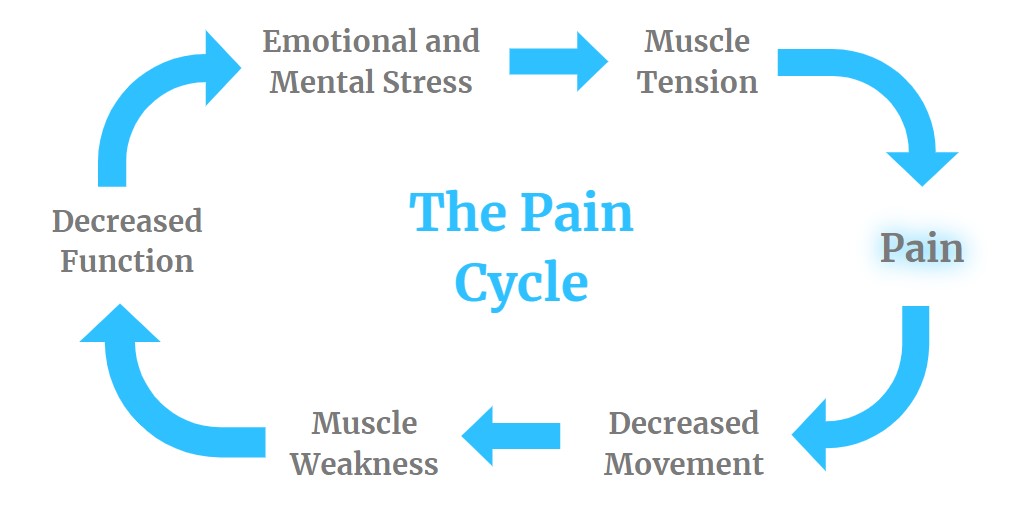
Click the “Show More” button below to reveal 3 strategies you can use to break out of the pain cycle.
Disrupting the Pain Cycle
- Body Scanning
- Breathing
- Enjoyment
![]()
With practice, a body scan can help you release muscle tension, promote relaxation, and reduce back pain by fostering a sense of self-care and deepening your mind-body connection. The point of a body scan is not necessarily to change how you feel immediately, but rather to help you understand your body’s needs.
To perform a body scan:
- Begin by finding a comfortable position. This can be standing, sitting, or laying down.
- Close your eyes and take deep controlled breaths.
- Direct your attention towards your head. Become aware of any tension, pain, or stress, you might be holding in this area. As you exhale, imagine this tension and stress leaving with your breath.
- Slowly shift your attention to your ears, then face, then neck, then shoulders, and so on working your way downwards. At each stop acknowledge any tension, pain, or stress.
- Pay extra attention to your back and problem areas. What exactly do you feel physically? How do these sensations make you feel emotionally? Take a moment to recognize that your physical sensations do not have to dictate your mood, acknowledge the sensations without judgment and breathe through them.
You should find that after a body scan, you feel more control over your emotions and you should feel a restored sense of control over your body.
![]()
Breathing is a unique aspect of our physiology as it bridges the gap between our conscious and subconscious minds. With ease, you can switch between breathing automatically and actively controlling your breath. We can take advantage of this connection and use our breath to consciously have an effect on our autonomic nervous system. Our autonomic nervous system plays a big part in regulating anxiety, muscular tension, and pain perception. Below you will find two breathing techniques you can use to have a positive effect on your autonomic nervous system:
Technique #1: The Physiological Sigh
- Inhale maximally through your nose.
- Once your lungs are full, hold your breath for 1 second and then, without exhaling, take another quick sharp inhale to fill your lungs even further.
- Slowly release this air through your mouth without forcing it.
You should feel a sense of immediate calm and relaxation after performing this breathing technique.
Technique #2: Box Breathing
- Inhale through your nose for 4 seconds.
- Hold your breath for another 4 seconds.
- Exhale for another count of 4 seconds.
Repeat this cycle as needed until you feel begin to feel a sense of calm and relaxation.
![]()
Back pain has likely decreased your ability to participate in activities that you find enjoyable. Before you are able to do these things again without any pain, it is important to find modified ways you can participate in things you enjoy without triggering pain. When you participate in activities that bring you joy, your body releases endorphins, which act as natural pain relievers. Additionally, doing things you love helps distract your mind from the pain, reducing its intensity and allowing you to remain more active.
Understandably, it can be difficult to prioritize activities we enjoy and we might be discouraged if we cannot do them to the full extent we want. But playing with your kids, going on walks, riding a bike, or doing whatever else it might be that brings you joy in whatever capacity you can manage will promote relaxation, improve your mood, and over time will help you experience an increase in function.
Limiting yourself to complete rest and avoiding any sort of movement or activity is more likely to increase your time of recovery than to shorten it.
One Last thing…
If you ever have any questions about your program or anything else related to our website, please don’t hesitate to reach out. Additionally, If you would like to share some feedback or your personal story we would also be happy to hear from you. You can reach us by clicking here.
And Remember:
